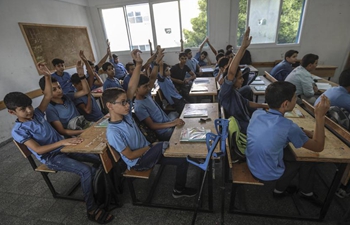BERLIN, Sept. 4 (Xinhua) -- The traditional Social Democratic Party (SPD) in Germany has slipped behind the upcoming right-wing populist party Alternative for Germany (AfD), an opinion poll by the political research institute INSA-CONSULERE (INSA) published in newspaper BILD on Tuesday shows.
With only 16 percent of voters' support, the SPD lost half a percentage point in one week while the AfD gained half a percent and is now a full percentage point ahead of Germany's governing junior coalition party. According to the poll, the AfD is thus Germany's largest political power, relegating the SPD to third place again. In July, the right-wing populist party already overtook the SPD for the first time.
However, an analysis of the poll by INSA shows that the SPD could potentially get 25 percent more votes from other parties' voters and also the lowest level of overall rejection. "Our analysis shows that the SPD has a much higher additional potential, but the AfD has more reliable votes," INSA director Binkert told Xinhua on Tuesday.
Chancellor Merkel's alliance of Christian Democratic Union (CDU) and Christian Social Union (CSU) is increasing in popularity by half a percent and now stands at 28.5 percent.
INSA managing director Hermann Binkert said that the "position of the SPD as the second strongest political force in the federal government is in danger." According to the survey, the coalition of CDU/CSU and SPD would currently not reach the required parliamentary majority of 44.5 percent.
"The AfD has become part of a violence-oriented and sometimes violent right-wing popular front in the east [of Germany]. This has already been demonstrated in the cities of Cottbus as well as Chemnitz," political scientist Hajo Funke told the newspaper BILD.
In the Saxon city of Chemnitz, violent demonstrations took place after the alleged murder of the 35-year-old Daniel H. by refugees last week. The AfD and the right-wing movement PEGIDA had subsequently promoted a joint "funeral march". It was the first time that the AfD had publically showed itself together with PEGIDA so prominently.
The AfD and their supporters could feel encouraged because the German government was showing weakness in dealing with the events surrounding the Chemnitz murder, according to political scientist Funke. The Saxon police has been criticized for underestimated the number of participants at the first demonstrations after Daniel H.'s death, which ended in chaotic and violent scenes in Chemnitz. "That may add one or two percent in the East of Germany in the next polls. But in the medium term this will harm the AfD," Funke explains.













